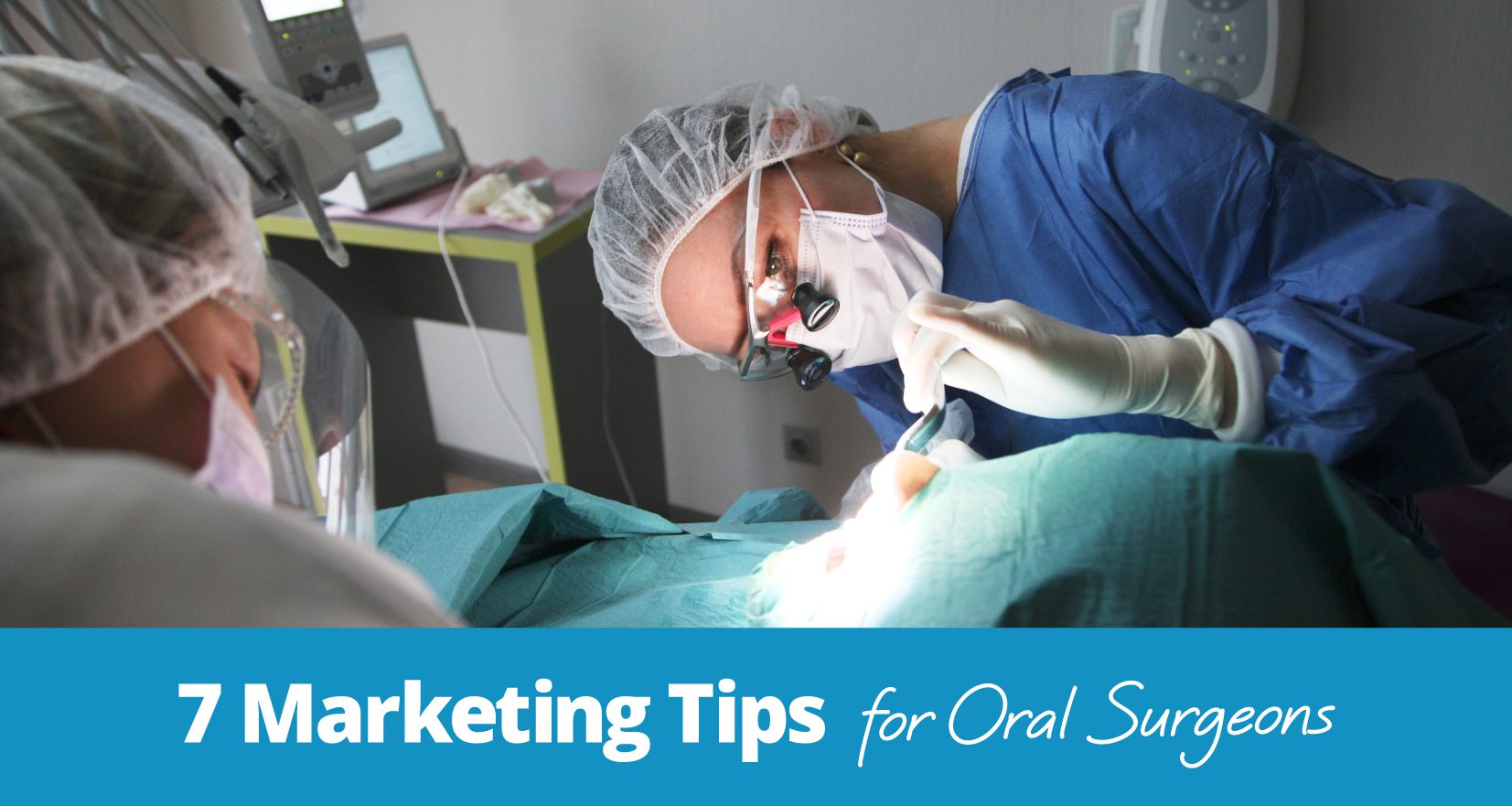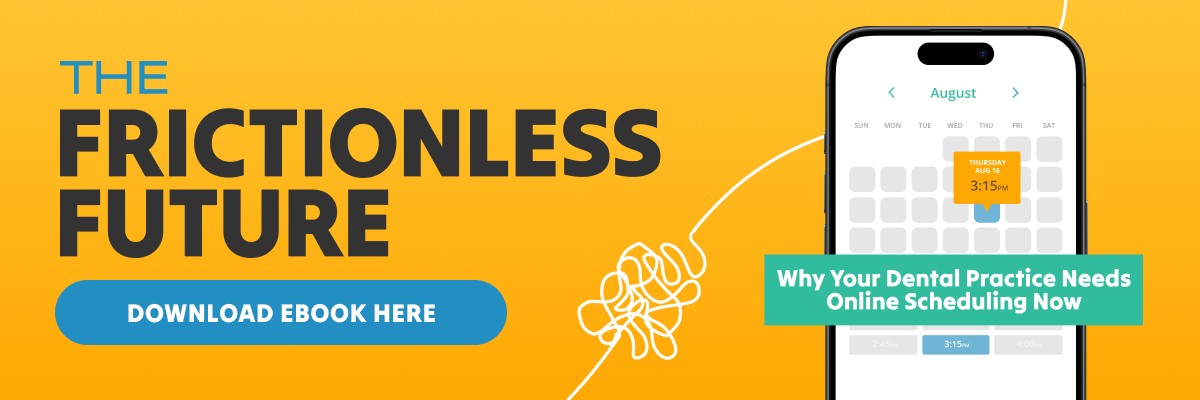
Mastering Oral Surgery Marketing: 7 Proven Strategies
We’d say that marketing for oral surgeons is like pulling teeth, but you’re already good at that!
Dental marketing strategies for oral surgeons are particularly unique because of the way you acquire patients and grow your practice, but that doesn’t mean that traditional marketing avenues like SEO (Search Engine Optimization) or social media marketing should be pushed to the back burner. You can put these tools to work for you so that you can organically attract new patients and dental partners, and build a thriving practice.
1. Be Found on Google Maps
If you want to start attracting dental implant patients, you need to show up on the Search Engine Results Page (SERP). Part of the SERP involves Google Maps results, which are also crucial for people searching for your services in your local area.
To improve your Google Maps visibility, start with your practice information on Google. Is everything updated and current? This includes contact information, locations, hours of operation, and links. You can update this information in your Google Business Profile (GBP). Your Google Business Profile supports your Google Maps search results, so by maintaining a clean, updated GBP, you are also improving your Google Maps results.
Second, you can actually use keywords in your GBP to improve search rankings. For an oral surgeon that might look like “wisdom teeth extraction” or “dental implant specialist.” Using these keywords helps the Google algorithm categorize your business profile properly and drive more traffic to your website.
Third, regularly update your profile. There are rarely “set it and forget” solutions in marketing, but keeping your GBP updated is really simple. Most updates after your initial audit and clean-up will be straightforward. At least monthly, add photos of your practice or staff, update hours for holidays, post updates, and always be attracting and responding to reviews. (More on that to come.)
If you want to see how your practice ranks on Google Maps, run a google maps ranking report. You can unlock the mystery of where your practice lands in Google Maps and even sneak a peek at how your competitors are performing. This is a great place to start improving your Google Maps SEO.
2. Be the Best Choice on Google Maps
Now that you have the foundational tools to be the best oral surgeon on Google Maps, you need to be the obvious best choice on Google Maps. How do you stand out among competitors?
Ranking high on Google Maps means that you show up on the first page of Google every time someone searches for oral surgeons in your area. Your Google Maps search rankings goal should be to make it into the top three results, known as the “Google Map Pack”. This is prime real estate for any small business. The number one slot in the Google Map Pack gets the highest click-through rate of any other listing.
How do you get more Google reviews?
After implementing your strategy updates, the biggest element of your Google Maps SEO strategy is actually collecting more positive reviews than your competitors. Think about it, why do consumers choose a product or a service in an industry? They look at who has the most positive reviews.
You’ll be chosen by both patients and referring dental partners because of your reputation. With something as intimidating as oral surgery, people want to know that they (or their patients) will be in trusted hands. You need more Google reviews to boost your reputation and you can do that by running a Google review campaign.
Strategizing how to collect Google reviews for dentists and specialists may depend on how you best communicate with your patients. You can use text messaging, emails, or a postcard with a QR code as part of your review collection campaign.
The best time to collect reviews is right after a positive experience. If you are trying to boost your reviews by reaching out to past patients, focus on those you know will leave a positive response. By far the best way to make sure this process goes smoothly is by incentivizing your staff! Automated systems make this easy. We recommend a tool that identifies who helped a patient during their visit and immediately rewards staff for gathering new Google reviews.
Prioritizing boosting your Google Maps rankings and collecting more Google reviews will cement your reputation as a trusted, experienced, and helpful oral surgeon. Additionally, it will consistently drive new traffic to your website, making this a great tool in marketing for oral surgeons.
3. Get on TikTok
Before you write off TikTok completely and move on to the next section, take a look at these dental professionals who are thriving on social media.
Social media is a great way to build your reputation as an oral surgeon and connect or collaborate with local dentists. TikTok, in particular, is the perfect space to share short, simple videos. Think about the potential you have to share jaw-dropping before and after examples showcasing the impact of oral surgery.
Still intimidated by TikTok? Here are a few examples of simple videos you could make (over and over too) to start growing on TikTok:
- Show a before and after transformation
- Ask a patient to share their experience in your practice
- Talk about a procedure, how it works, and what to expect
- Discuss when, and if, wisdom teeth need to be pulled
- Talk about dental care after a procedure
- Hop on a trend just for fun
TikTok makes it easy to find new trends (just scroll until you see a recurring audio or video) and reach thousands of viewers in a short amount of time. With a little practice, TikTok can become a fun and creative way to engage in marketing for oral surgeons and educate about oral health and your role as an oral surgeon.
How do you get started on social media?
Social media for dentists and oral surgeons isn’t as scary as it sounds. In fact, users prefer content that is not overproduced, which makes things easier than ever before. Just grab your phone and start documenting what happens in your practice. You can showcase your personality, highlight your staff, and collaborate with local dentists and businesses.
Sharing patient experiences and the results from dental transformation is extremely impressive. This works in the same way as your Google reviews by giving future partners and patients a reason to trust you. It all factors into building a positive reputation for you and your practice. When it comes to sharing photos and videos of your patients online, start with this complimentary HIPAA consent form.
4. Evaluate Your Website’s Technical SEO
If you put all that effort into improving your Google Business Profile and get yourself proudly into the Google Map Pack, it will be for nothing if every person who clicks on your website is met with a horrible online experience. Even the best-looking websites can be riddled with poor functionality and misinformation.
Technical SEO (Search Engine Optimization) is the process of improving the readability of your website for search engine algorithms so they can properly categorize and rank your website based on user needs. Technical SEO also refers to the elements that improve user experience so that website visitors spend more time on your website, thus proving to Google that, “Hey, this is a great website where people are finding what they need, you should show it to more people!”
Dozens of factors go into evaluating a website and its SEO performance. You may want to consider hiring a dental marketing company that specializes in SEO and digital marketing for dental professionals. In the meantime, here are some areas you can focus on to improve your website’s SEO:
- Website speed: Page loading time is crucial for SEO. If your website or pages are taking more than 3 seconds to load, you need to evaluate how to improve your page speed. You can test your page speed with Google’s PageSpeed tool.
- Mobile optimization: Most searches are performed on mobile devices which means your website needs to be responsive to multiple devices. If you can’t navigate your website on a mobile device, you’ll quickly lose website traffic. Google actually predominantly uses mobile websites when it comes to ranking and indexing. So if you aren’t optimized for mobile viewing, you’ll greatly damage your search rankings.
- Fix dead links: If you have pages that result in a “404 Page Not Found” message (even if they are buried in your website), it’s time to clean them up. Set them up with a 301 redirect that will drive traffic to an updated or more helpful page. This stops Google searchers from immediately jumping off your website when they hit a dead link and damaging your rankings.
- Write original copy: From your homepage to your About section, your website should be full of keyword-rich content that was originally created for your use. (No copy-and-pasting here!) Keywords should be used throughout your website, but there’s no place better to generate fresh content than your blog. Regularly update your blog with industry news, tips, and stories that can help future partners and patients see the value in your services. New content signals to Google that your website is current and active, which can help boost your search engine rankings.
- Compress images: Large file-size images can slow down your website and hurt your SEO. Make sure you are following the latest recommendations for the image file type (WebP format), compressing images, and using original photo content where you can. Plus, ALT descriptions and file names of your images are great places to include keywords for your website.
- HTTP vs HTTPS: As a healthcare provider, website security is particularly important. An HTTPS website is more secure than HTTP because the information being transmitted is encrypted. When you’re building marketing strategies for medical practices you want to make sure everything you do online is still HIPAA-compliant and secure.
- Check your sitemap: A sitemap helps search engines successfully crawl and index your website properly. This is especially important if your website is large. It also helps search engines discover new pages when they are added so they can start generating traffic as well.
Technical SEO may be a bit of a beast to tackle on your own, but it can turn your website into a lead-generating machine, all while you spend time working with patients. To get started understanding your website’s SEO you can run a technical SEO audit for free. This will identify areas in need of improvement as you work toward a technically proficient website.
5. Optimize Your Oral Surgery Website for AI Search Engines
As AI-driven search tools like ChatGPT, Google’s AI Overviews, and Microsoft Copilot become more integrated into how patients find healthcare providers, optimizing your website for these platforms is the next frontier of digital marketing.
AI tools don’t just rely on keywords, they rely on context. Here’s how to make sure your practice is discoverable by both traditional search engines and emerging AI systems:
Make Your Content Accessible
AI crawlers read text, not images. Make sure that crucial details — such as your procedures, pricing information, or post-op care instructions — are clearly written out rather than embedded in graphics or PDFs.
Create an “AI-Friendly” Page
Add a dedicated Oral Surgery Services Overview page that clearly explains what you do, who you treat, and what sets your team apart. Include concise answers to questions like:
-
“What is oral surgery?”
-
“What’s the difference between an oral surgeon and a dentist?”
-
“What should I expect after dental implant surgery?”
This type of content helps AI tools accurately describe your expertise when patients ask questions like, “Who’s the best oral surgeon near me?”
Write Conversationally
AI algorithms favor natural, human-sounding language that mirrors how patients actually ask questions. Instead of writing “osseointegrated dental implants,” say “dental implants that fuse securely with your jawbone.”
Add and Expand FAQ Sections
Include FAQ pages that answer common pre- and post-surgery questions, like recovery time, anesthesia options, and payment plans. This helps you appear in both voice searches (“How long does it take to recover from wisdom tooth surgery?”) and AI-generated summaries.
Stay Ahead of the Curve
AI search is rapidly changing the digital landscape. By optimizing for both AI and traditional search engines, your oral surgery practice will stay visible — and relevant — no matter how patients choose to search.
6. Showcase Patient Video Testimonials and Case Stories
If a picture is worth a thousand words, then a video testimonial is worth a thousand referrals.
Oral surgery can feel intimidating to patients, but seeing and hearing real people share their positive experiences helps dissolve fear and build trust. Video testimonials give potential patients a glimpse into what it’s really like to work with your team from the first consultation to the recovery process.
Here’s how to make video storytelling a powerful part of your oral surgery marketing strategy:
Ask Patients to Share Their Stories
After a successful procedure, ask your happiest patients if they’d be willing to talk briefly about their experience. Keep it casual! Capture just a short conversation where they share why they chose your practice, what they were nervous about, and how they feel now.
Make sure to have proper permissions before filming. To make this easy, download and use our free HIPAA Photo Consent Form, which ensures you remain compliant while celebrating your patients’ success stories.
Keep Videos Short and Authentic
Professional lighting and editing can help, but don’t overthink it. Videos that feel genuine perform best on platforms like Instagram Reels, TikTok, and YouTube Shorts. Record in your office with natural light and a friendly tone.
Focus on:
-
Before-and-after transformations — particularly for dental implant or reconstructive cases.
-
Quick testimonials from patients talking about comfort, results, and staff friendliness.
-
Behind-the-scenes clips of your surgical team preparing or celebrating successful outcomes.
-
Doctor explanations — you or your surgical team can discuss common concerns (e.g., “What to expect during wisdom tooth removal”).
Repurpose and Share
Don’t let a great testimonial live in one place. Post snippets on social media, embed videos on your website, and upload them to your Google Business Profile. You can also include them in emails to referring dentists or on landing pages for specific procedures like dental implants or bone grafting.
Why It Works
Video builds trust faster than text. For a specialty that depends on both patient confidence and professional referrals, a few powerful video stories can help you stand out from competitors and humanize your practice.
When patients can see and hear real results, they’re far more likely to schedule their consultation with you.
7. Start an Oral Surgery Blog
For some, blogging might feel as daunting as a complex oral surgery procedure, but rest assured, this won’t cause any discomfort.
Blogging is the foundation of your dental SEO strategy, serving as a powerful tool to propel your website to the top of the Search Engine Results Page (SERP).
Consistently updating your blog provides numerous opportunities to enhance your website’s performance, boost your credibility, and create content that can be repurposed across your marketing channels. It becomes a valuable resource for prospective patients and showcases your proactive, up-to-date, and knowledgeable approach as an oral surgeon.
So, how do you get started on professional blogging? Here’s what dental marketing experts recommend:
- Remember: Your target audience is not your fellow oral surgeons. Craft content that addresses questions and resolves issues for potential patients. Begin with FAQs and then expand to other topics relevant to oral surgery, implantology, and oral health.
- Infuse your blog with your practice’s personality. Your posts don’t have to read like articles from dental research journals. This is an opportunity to incorporate a touch of lightheartedness while discussing serious subjects.
- Create an outline for each blog post. Both the Google algorithm and real-life readers appreciate easily digestible content. Utilize headers, subheadings, and bullet points to present information in a concise and accessible manner.
- Provide your readers with key takeaways. You don’t have to reinvent the wheel, but give your audience a reason to engage. This includes crafting compelling blog titles to captivate them from the start. Incorporate clear calls to action within your posts, encouraging readers to take the next step.
- Remember, done is better than perfect. There’s no grading system for your blog work, so instead of fixating on minor details, hit that publish button. Establish and stick to a consistent blogging schedule to build a library of valuable content.
- Consider outsourcing your writing needs. If feasible, delegating your blog writing can save you valuable time and ensure consistent output. You can hire a freelancer or collaborate with a dental marketing company. Choose a writer with experience in your industry or someone who can match your practice’s tone and style. Request a sample of their work before getting started.
Blogging can be hugely beneficial and we recommend it as a strategy when marketing for oral surgeons. You can elevate your online presence, attract a wider audience, and establish yourself as a trusted authority in the field of oral surgery.
Getting Started with Marketing for Oral Surgeons
Now that you understand the value of Google Maps, positive reviews, technical SEO, and social media you are fully equipped to start making impactful changes to your dental marketing strategies. By implementing these changes, you can start attracting new dental partners and happy patients who need expertise like yours to improve their oral health.
If you want faster results and professional support, lean on a dental marketing agency like My Social Practice. Check out how to choose a dental marketing company so that you can find a partnership that makes the most sense for your marketing goals.
Need Help? We’ve Got The Perfect Referral for That
If you are short on time or just ready to make immediate improvements to your dental marketing strategy, our team at My Social Practice would love to help. We are dedicated to elevating dental marketing to be both fun and effective. Get a personalized no-obligation dental SEO summary and quote today.
Frequently Asked Questions
How do I grow my oral surgery practice?
Digital marketing for oral surgeons is the best way to grow your practice. We recommend employing multiple complementary marketing strategies to increase your visibility, patient trust, and reputation. A good oral surgery marketing plan should include a focus on both website and local SEO, a well-designed oral surgeon website, an active social media presence, regular content and blogs, reputation management, and more. A dental marketing company can help you invest in the strategies that are most likely to help your practice succeed.
Do oral surgeons need marketing?
Yes! While referrals still play a critical role in the success of an oral surgery practice, more patients find specialized dental services through online searches than ever before. Building online visibility through marketing for oral surgeons is crucial to making sure your practice receives new patients who would otherwise call an office with higher rankings in Google search results. Focus on local SEO for oral surgery and related keywords to signal to Google that your practice is the foremost authority in your area. Optimize your Google Business Profile to match high-volume keywords so that you can appear at the top of the Google Maps results.
Do oral surgeons need a website?
A website is an invaluable tool in marketing for oral surgeons. Not only does your website provide a first impression to prospective patients, an SEO-focused site boosts your visibility in Google search results, helping your practice rank higher for critical keywords. A great oral surgery website should provide easily-accessible information for patients, communicate your brand identity, and feature regular blog content to help your practice continue to build authority for oral surgery-related keywords.
About the Author: Adrian Lefler is a dental marketing expert at My Social Practice located in Salt Lake City, Utah. Interested in learning more about the benefits of oral surgery marketing, please schedule a complimentary consultation.


![[Byte Sized Podcast Ep. 29] Building the Infrastructure for AI in Dentistry Feat. Dr. Kianor Shah - marketing for oral surgeons - My Social Practice - A dental marketing company helping practices find new patients My Social Practice - A dental marketing company helping practices find new patients - marketing for oral surgeons](https://mysocialpractice.com/wp-content/uploads/2026/02/byte-sized_ep29.png)






![[Byte Sized Podcast Ep. 29] Building the Infrastructure for AI in Dentistry Feat. Dr. Kianor Shah - marketing for oral surgeons - My Social Practice - A dental marketing company helping practices find new patients My Social Practice - A dental marketing company helping practices find new patients - marketing for oral surgeons](https://mysocialpractice.com/wp-content/uploads/2026/02/byte-sized_ep29-100x100.png)

